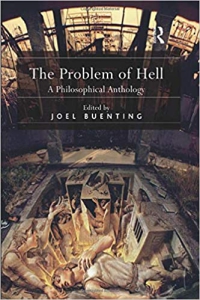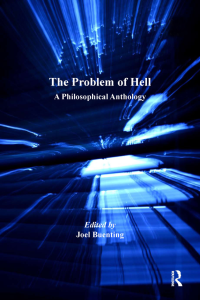The Problem of Hell, A Philosophical Anthology
- A philosophical discussion focusing on philosophical issues arising from reflection on the theological doctrine of eternal punishment.
- Published November 15, 2016, by Routledge
Edited By: Joel Buenting
ISBN 9781138265967
246 Pages
This volume discusses how a perfectly good God can send someone to Hell. Whether it is fair or unfair for God to send someone to Hell is one of the issues raised in the problem of Hell. So the argument of Hell will be challenging for anyone who believes that (a) there is life after death and (b) that some people suffer for eternity. In framing the problem in terms of fairness and justice, I follow the early work of Marilyn McCord Adamsra. Others plan the situation differently. John Hick, for example, thinks Hell is a problem because the presence of sinners in Hell is an insult to God’s sovereignty. Likewise, hell is a problem for Peter Gitch because the fact of sinners in Hell bothers God’s creation forever. Despite these changes, many commentators make the suffering of sinners a significant problem. For example, Jonathan Kwanwig thinks Hell is a problem because there is no goal or point more prominent than suffering in Hell.
Since one has no hope of going to Hell, Hell is just an endless misfortune. Others describe the relationship between Hell and suffering by modelling the problem of Hell afterwards. The logical problem of evil. It continues, then ends with a question about their compatibility. In the discussion of Hell, “it is evil” is replaced by the assumption that “at least one person suffers for eternity in hell.” Relying on pre-theoretical intuitions about the evil of Hell, one asks the question, “How is the infinite goodness and mercy of God compatible with the endless torment and suffering of a sinner?” The problem arises. So it is reasonable to say that the “hell issue” refers to a family of closely related issues formed when we take the doctrine of eternal punishment seriously. Predictably, the key differences about Hell are the best solutions to these problems. For a good reason, some argue that an acceptable doctrine of Hell can be maintained. The issue of Hell, we consider it objectionable. Others argue for the possibility of salvation after death, whether the inhabitants of Hell accept this opportunity or not. Still, others argue how we conceive of the concept that personality, freedom of will, and divine foreknowledge significantly influence these issues.
Apart from these topics, the other contributions in this volume show how thinking about Hell creates other problems in the mainstream of Christianity. one answer to the problem of Hell is to argue that Hell is empty. That is a cosmopolitan answer to the problem of Hell; Secularists say that everyone will eventually reconcile with God in heaven. In the first chapter of this volume, Thomas Talbot discusses the relationship between cosmopolitanism and grace. Talbot argues that the concept of grace means our choices in forming a good character better than the libertarian idea that individuals are responsible for creating their moral character. Our free options (good or bad) allow God to show His love’s true character and nature. So after criticizing Robert Kane’s idea of ”self-destructive” action, Talbot outlines ways in which it makes sense to think about God’s role in the decisions we make. Talbot thus explains how God actively participates in a person’s moral development so that “a glorious end is inevitable in the end.” The cosmologists do not deny existence after death in a state or place other than heaven, but they deny that everyone is in Hell forever. In Chapter 2, Ray Van Aragon argues that a sinner may remain in Hell forever. In addition, God may be justified in allowing this to happen.







